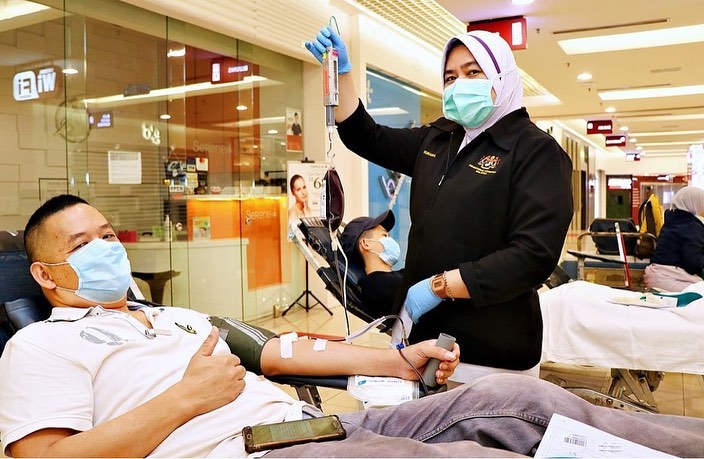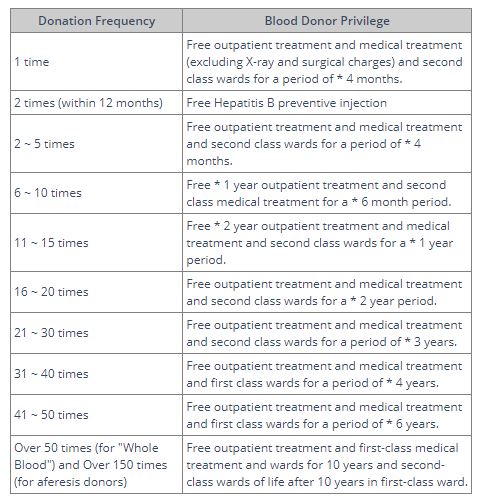Donating blood is a great way to give back and get these perks, here's what you can get if you do it


(People donate blood during the ‘Blood Hero Day’ programme in Klang June 28, 2020. — Picture by Yusof Mat Isa)
Aside from free government hospital care, you may also take advantage of a number of additional health services.
Did you know that blood is a perishable substance with an expiration date of approximately 35 to 42 days? This is why hospitals continue to need blood donations, as they are in constant demand. Another interesting fact is that giving one pint of blood (about 450ml) can save up to three lives.
An adult person has around 5 liters (approximately 10.5 pints) of blood. Only 10% (one pint) of blood is taken from the body during a blood donation. A person can become anxious, confused, and their blood pressure will rise if there is a 20-40 percent loss of blood. However, a loss greater than 40%, or even just one half cup, can lead to severe shock and unconsciousness in some cases.

(Credit: Pusat Darah Negara Kementerian Kesihatan Malaysia/Facebook)
When they've lost around 50% of their blood volume, the body's ability to pump blood and supply oxygen decreases. If no treatment measures are implemented, they will eventually lose their capacity to pump blood and keep oxygen flowing when they have lost approximately half of their blood volume. They may be in a coma or worse yet, die if unopposed life-saving methods aren't used right away.
That is why, as you can see, a healthy blood volume is so essential to us. It does in fact save lives. That's also why blood donation programs are so vital. Apart from the noble cause of giving blood, do you realize that there are additional benefits for you?
Existing Benefits of Blood Donation
1. Free Medical Benefits
According to the number of times you've donated your blood, you can actually obtain free medical care from public hospitals. This includes a free Hepatitis B vaccine and outpatient treatment. You can get into first-class wards in a public hospital if you're lucky and persistent enough to give more than 30 times.

Schedule of Benefits of Blood Donor Treatment at Health Facility (Hospitals, Institutions and Health Clinics), Ministry of Health Malaysia in accordance with KPK Circular Letter 5/2005 dated 20 July 2005.
(Credit: ummc)
2. Free Health Check-Ups
Before any blood is taken from your veins, you will be subjected to a brief physical examination and a blood test. They aren't comprehensive tests, but anemia or high/low blood pressure may be discovered using them.
The physical examination, which includes checking a person's blood pressure, body temperature, heart rate, and hemoglobin or iron levels, is part of the process. If any of these don't check out, the individual is not allowed to give blood and this may be the beginning of identification for them to receive further medical care for other health issues.

(Credit: Freepik)
3. Stimulate Blood Cell Production
When you donate blood, your body naturally tries to replenish the lost blood. The formation of new blood cells in the bone marrow will stimulate and help to maintain good health as a result.

(Credit: Freepik)
4. Prevents Hemochromatosis & Maintain Iron Level
We have iron in our blood (hemoglobin) and there are varying amounts of good and bad iron in our bodies, depending on the circumstances.
Individuals with hemochromatosis have an excessive amount of iron in their bodies. Excess iron may accumulate in various organs of the body, affecting their operation, including the liver and heart.
As a result, individuals who give blood may maintain a healthy iron level while also assisting others.
5. Reduce Risk of Heart Attack
A study published in 2013 claims that giving blood reduces the chance of suffering a heart attack since higher iron stores are linked to an increased risk of cardiac events.
In 2019, researchers discovered that blood donation has a ''long-term protective effect against heart disease'' after examining the data of almost 160,000 women who donated blood for 10 years.

6. Reduce Risk of Cancer
Blood donation has anti-cancer effects since a lower iron level in the body is linked to a reduced cancer risk. The iron stores in the body are maintained at an optimum state by giving blood on a regular basis.
7. Help In Weight Loss
It's been shown that regular blood donation can help you lose weight by burning calories, but it's only a one-time thing.
This is useful for individuals who are overweight or have an increased risk of cardiovascular disease or other illnesses. It can also identify people with low weight and help their diet and exercise habits.

(Credit: Freepik)
Oct 04,2022
